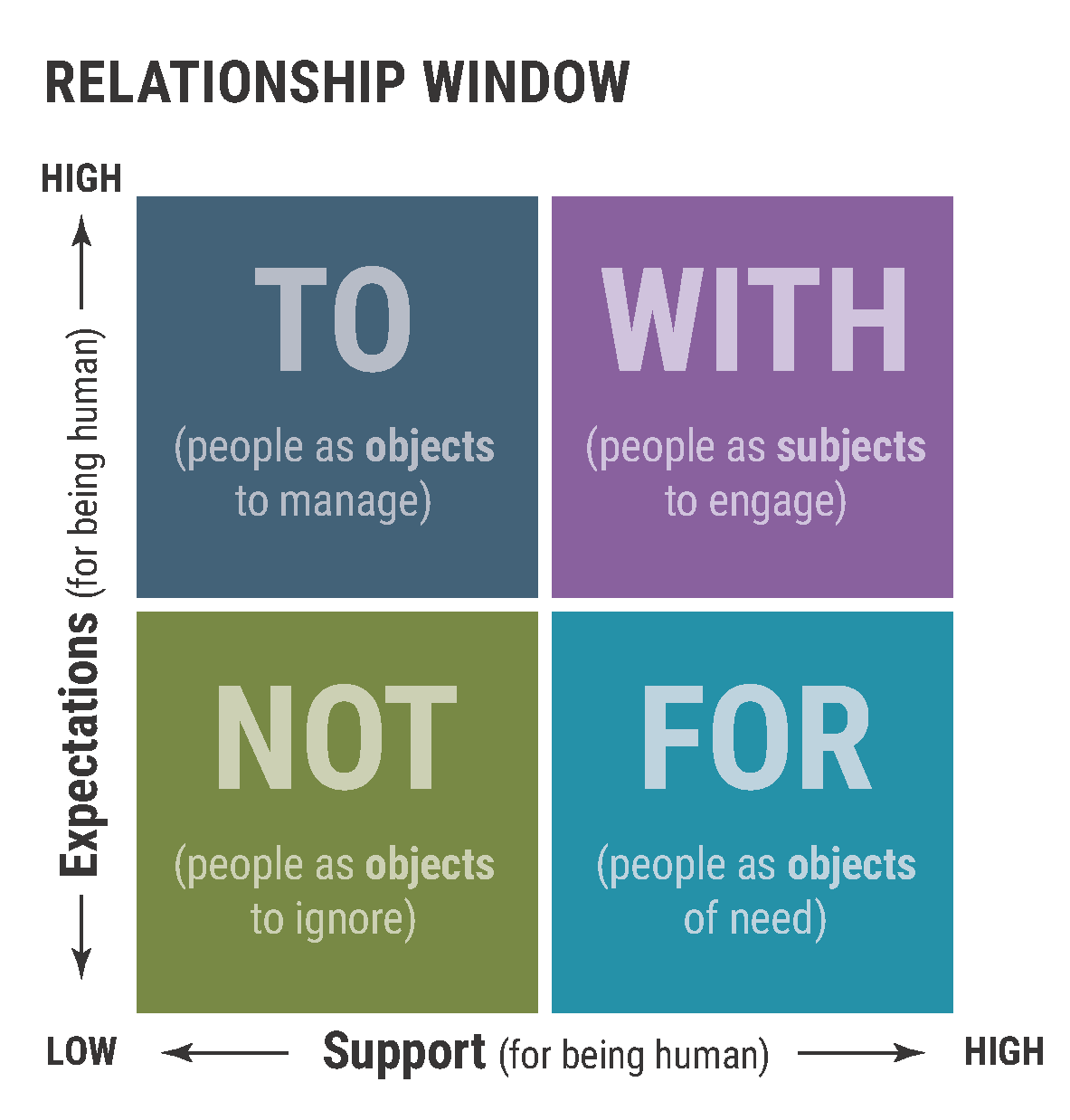This question appeals to the CST theme of Subsidiarity as well as the Call to Family, Community, and Participation.
We encounter God in our interactions with one another. Each person has a right and a duty to participate in society and holds a responsibility to work with others for the common good and well-being of all — especially the poor and vulnerable.
Restorative justice invites people to share their stories in their own terms and to hear others’ stories with respect, together seeking a shared narrative of what happened, why, and how best to move forward.
Incarceration removes a person from society. Often, victimization can have a similar effect. A restorative approach seeks ways to limit isolation and find healing in communion with one another.
There are a number of different paths that your group may take depending on how you answered the questions in the preceding section. As you consider the process, a number of themes are important to remember.
Importance of Sharing Power
When power is shared, trust and empathy are built, and participants in a restorative process are more likely to meet their obligations to each other. As a result, change is more sustainable.
Restorative approaches emphasize moving from “top-down” or “power over” approaches to “bottom-up” or “power with” approaches. In other words, rather than decisions being made for or about others, those most impacted by the harm shape both the outcome and the process itself.
The following graphic demonstrates these approaches to power in the context of relationships. The most restorative and dignifying encounters take place when we engage with others in the spirit of accompaniment, treating one another as both capable (high expectations) and lovable (high support) in our shared humanity.
This is true for harmed parties and responsible parties alike. Such a shift can be particularly unsettling among those who traditionally hold positions of authority and influence because of their position within an institution or privilege.
Figure 3: Relationship Window II (Vaandering)
Vaandering, D. (2013). "A window on relationships: Reflecting critically on a current restorative justice theory". Restorative Justice: An International Journal, 1(3). DOI: 10.5235/20504721.1.3.305
Reflection Questions
-
What kinds of power do I/we have? How are we prepared to use it responsibly? How are we prepared to let go of expectations for power and influence?
-
What restorative practice is most suitable to this circumstance? (Circle process, community conferencing?)
-
Are we the appropriate people to facilitate those processes? If yes, how will we train/equip ourselves? If not, who is, and how can we be supportive?
Training and Mentoring
Training is a critical component to engaging with restorative practices, especially if you or others in your group plan to act as facilitators. Approaches to a given practice may vary by agency, geographic, or cultural context.
Restorative practices can be transformative, but the invitation to vulnerability can also be difficult or distressing for the parties involved. The greater the trauma or injustice, the greater the potential for repair, but also the more complex and difficult the process can be.
If untrained or undertrained people attempt to facilitate a process involving complex harm or trauma, further harm can result. This is a risk not only for individual participants/communities, but also to the public understanding of restorative justice.
In addition to adequate training, seek complementary learning resources and opportunities for mentorship/accompaniment/feedback with an experienced facilitator.
Reflection Questions
-
Having learned about your environment and built relationships with your local community, is there a local training opportunity that addresses the need you have identified?
-
If not, is there a program or model in another part of the country that seems applicable to your context? How will you connect with and learn from them?
-
Is there new research in the field of restorative justice that may be applicable to your process?
Evaluating Process and Impact
It is important to periodically revisit goals, review progress, celebrate successes, identify challenges or shortcomings, and make modifications.
This intentional reflection is also an opportunity to revisit the guiding questions and principles of restorative justice and consider how they are being upheld.
Assessment of a Particular Process
Be sure to elicit the feedback of those whom your ministry seeks to impact. Ask all those involved how they felt about the process.
-
Did everyone have a voice in the process? Did those most impacted have power over the decisions made about them?
-
Was everyone’s dignity respected and was there a sense of caring?
-
Did the intervention leave the community stronger than it was before?
-
Did the intervention increase community skills for problem solving about responses to harm and violence?
-
Did it increase empathy, connectedness, and commitment to the common good?
Reflection Questions
Here are some questions that the group might reflect on together on a regular basis. Begin by revisiting your initial goal and the core values, questions, and principles of restorative justice.
-
In what ways have we made progress toward accomplishing our goal?
-
What barriers, challenges, or conflicts have come to light that still need to be addressed?
-
Personally, what brings joy or consolation? What brings desolation or uncertainty? What have we learned about ourselves as a group in the process?
-
What changes might we need to make moving forward? What additional training, support, or relationships are needed?



